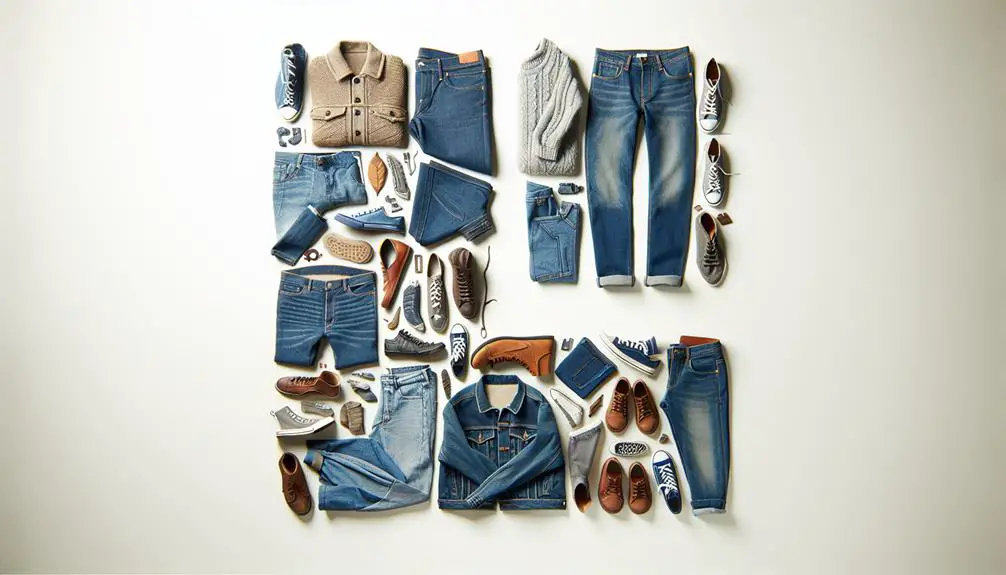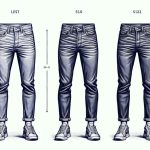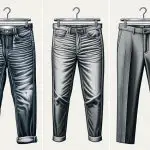So, let's chat about Levi's and whether we can really pin it down as just a denim brand. I've been digging into its history, and it's clear Levi's has been a massive player in the denim game since the Gold Rush days. But here's the thing, they've evolved way beyond just whipping up jeans. Sure, they kicked things off with those durable pants for miners, but now? They're dabbling in everything from Dockers to yoga wear. Makes you wonder, has Levi's outgrown its denim roots, or is that rugged, indigo fabric still the heart and soul of the brand? Stick around, and we might just unravel this denim mystery together.
Table of Contents
Key Takeaways
- Levi's was founded in 1853, initially aiming to provide durable pants for miners, marking its origins in denim.
- It introduced the iconic 501 copper-riveted jeans in 1873, establishing itself as a pioneering denim brand.
- Levi's has revolutionized denim fashion, leading modern trends and innovations in the denim industry.
- Beyond denim, Levi's has expanded into other apparel through lines like Dockers and Beyond Yoga, diversifying its product offerings.
- Despite its expansion, Levi's core identity and historical significance are deeply rooted in denim, making it a quintessential denim brand.
The Origin of Levi's
Levi's kicked off in 1853 when Levi Strauss hit San Francisco, aiming to kit out miners with sturdy pants during the Gold Rush. You see, back then, Levi was all about providing durable gear that could withstand the rough and tumble life of miners chasing their fortunes in California. The idea was simple yet revolutionary: make something tough enough for the grittiest work.
Fast forward a bit, and in 1873, Levi Strauss, alongside Jacob Davis, cranked up the durability factor by patenting the use of copper rivets in work pants. This wasn't just a minor tweak; it was a game-changer, making jeans the go-to for hardworking folks. The introduction of the Two Horse Trademark in 1886 hammered home the message: these pants won't let you down.
Evolution of Denim Fashion
So, let's talk about how denim fashion has changed over the years.
From its historical roots as sturdy workwear to the latest sustainable innovations, there's a lot to cover.
We'll also look at how modern trends keep denim at the forefront of fashion.
Denim's Historical Roots
To truly appreciate the modern denim we wear today, it's crucial to delve into its rugged origins, where it started as durable workwear before evolving into a global fashion phenomenon.
Initially, denim was the go-to fabric for tough, long-lasting workwear. Levi's, in particular, played a pivotal role in this journey. They didn't just make denim jeans; they transformed them into symbols of durability, reliability, and eventually, cool.
The brand's knack for innovation and design adaptation has been key in denim's transition from strictly utilitarian gear to a canvas for self-expression and style. Levi's managed to capture the essence of denim, showcasing its versatility and timeless appeal, solidifying its status not just as a workwear staple but as a cornerstone of fashion worldwide.
Modern Denim Trends
Understanding denim's historical journey, it's fascinating to see how its fashion has evolved, with brands like Levi's leading the charge in modern trends. They've really dialed into what we're all about today, from embracing the skinny jeans craze to throwing in those high-rise styles that everyone seems to love. It's not just about the look, either; it's how we're all moving towards more sustainable practices, even in our denim choices. Levi's is right there with us, making sure they're not just keeping up but setting the pace.
| Trend | Description | Impact |
|---|---|---|
| Skinny Jeans | Tight fitting, versatile | High |
| Distressed | Ripped and worn appearance | Popular |
| High-Rise | Above the natural waist | Trending |
It's all about adapting, and Levi's has shown they're not just stuck in the past.
Sustainable Denim Innovations
In the realm of denim evolution, Levi's is stepping up with groundbreaking sustainable innovations that are changing the game. They're not just making jeans; they're redefining what sustainable denim fashion means.
By sourcing materials that are kinder to the planet, they're showing the world that style doesn't have to come at the earth's expense. Their Project F.L.X. isn't just techy talk; it's about making the supply chain leaner and greener. I'm talking digitized designs that cut down waste and ramp up efficiency.
It's clear, Levi's isn't just playing lip service to eco-conscious practices. They're pushing the envelope, ensuring that their iconic jeans aren't just about looking good, but doing good too. As someone who's all about that sustainable life, I'm here for it.
Iconic Levi's Garments
Levi's has churned out some iconic garments over the years, like the game-changing 501 jeans. I've gotta say, those 501 copper-riveted waist overalls they patented back in 1873 with Jacob Davis? Groundbreaking. They didn't just stop there, though. Levi's kept innovating, introducing the first blue jeans for women in 1934, which was a pretty bold move at the time. And let's not forget the Two Horse Trademark – that symbol of strength showing two horses trying to pull apart a pair of jeans is legendary.
Here's a quick rundown of some of Levi's iconic pieces:
| Year | Garment | Significance |
|---|---|---|
| 1873 | 501 copper-riveted waist overalls | Introduced durable workwear with a patent for rivets |
| 1934 | Blue jeans for women | Expanded fashion by introducing jeans tailored for women |
| 1986 | Dockers | Revolutionized business casual with khakis |
Each of these pieces tells a story of innovation and quality that's been at the heart of Levi's brand. They're not just making clothes; they're crafting history. And that's something worth knowing inside out.
Cultural Significance
After exploring Levi's iconic garments, let's now consider how the brand has woven itself into the fabric of our culture. It's fascinating to see how Levi's has been the go-to denim for everyone from miners digging deep into the earth, to rebels making bold statements on city streets. This brand isn't just about clothing; it's a badge of authenticity and individuality that people across various walks of life have embraced.
Levi's doesn't just make jeans; it crafts stories of adventure, resilience, and self-expression. Whether you're a cowboy riding into the sunset or a rock star electrifying crowds, Levi's denim carries those experiences, shaping itself to your life and body. It's this genuine reflection of life's journeys that has solidified Levi's place in our hearts and history.
Moreover, the brand's trademarked arcuate design isn't just a decorative element; it's a symbol of a legacy that has stood the test of time. The fact that vintage Levi's can fetch a high price today speaks volumes about their enduring appeal and the collective nostalgia we hold for pieces that represent true authenticity. Levi's, in essence, is more than denim; it's a canvas of our collective experiences.
Levi Strauss & Co. Today
So, let's talk about where Levi Strauss & Co. stands today.
They've been pushing boundaries, not just with where they're selling but how they're doing it, focusing on expanding globally, upping their game in sustainability, and rolling out some really cool new products.
It's not just about jeans anymore; they're shaping up to be a major player in fashion and eco-consciousness.
Global Expansion Strategies
Diving into their global expansion strategies, Levi Strauss & Co. has spread its wings, operating around 500 stores worldwide and selling in over 100 countries. They've truly mastered the art of going global with their denim products.
What's impressive is how they cater to a wide array of fashion tastes, ensuring there's something for everyone. From classic Levi's jeans to brands like Dockers and Beyond Yoga, they've got our fashion needs covered.
But it's not just about spreading far and wide; they're doing it with an eye on sustainability. They're keen on reducing their carbon footprint, making sure that as they grow, they're not just taking from the planet but giving back too. It's this balance of global reach and environmental responsibility that's really setting them apart.
Sustainability Efforts Unveiled
Levi's is stepping up its game with a strong focus on sustainability, aiming to shake up the fashion industry with its eco-friendly practices. As someone deeply interested in where my clothes come from and their impact on the planet, I'm all in on dissecting how Levi's is making strides toward a greener future.
- Sustainable sourcing of materials to slash their carbon footprint.
- Minimizing environmental impact across the entire supply chain.
- Promoting sustainable practices within the apparel industry to foster an eco-conscious fashion realm.
Levi's commitment to sustainability initiatives isn't just talk. They're actively working to reduce their environmental footprint while encouraging the rest of us to think more about the eco-friendly practices behind our favorite denim. It's about time the fashion industry gets a green makeover, and Levi's is leading the charge.
Innovative Product Lines
Beyond just classic denim, Levi Strauss & Co. now boasts a range of innovative product lines like Dockers and Beyond Yoga, diversifying its wardrobe offerings.
Back in '86, they kicked off Dockers, hitting the mark with folks looking for something different from jeans. It wasn't just about casual pants; it was about reshaping casual wear.
Fast forward to 2003, Signature by Levi Strauss & Co. rolled out, targeting those who crave quality without breaking the bank.
And let's not overlook Beyond Yoga. This line's all about blending comfort with style, tapping into the activewear and athleisure trend.
It's clear Levi's isn't just playing the denim game anymore; they're crafting a wardrobe that meets all sorts of needs.
Beyond Denim Innovations
Exploring the horizon of denim, Levi Strauss & Co. isn't just sticking to jeans; they're venturing into tech-savvy fashion and eco-friendly practices. It's fascinating to see how they're pushing boundaries and setting new trends. Their journey beyond denim is nothing short of innovative, marked by strategic acquisitions and a steadfast commitment to sustainable practices.
- Innovations: In 2017, they introduced a smart jacket in collaboration with Google, skillfully blending fashion with cutting-edge technology. It's a bold move that places them at the intersection of style and digital innovation.
- Acquisitions: Their strategy isn't just about creating; it's about integrating. By acquiring Beyond Yoga in 2021, they stepped confidently into the activewear market, diversifying their portfolio and reaching new customers.
- Sustainable Practices: Transitioning to laser technology for creating those iconic ripped jeans by 2020 shows their dedication to reducing environmental impact. It's a game-changer for the industry, proving that sustainability and style can go hand in hand.
Levi's evolution from a denim-centric brand to a multifaceted lifestyle giant is a testament to their visionary approach. They're not just making jeans; they're crafting the future of fashion.
Frequently Asked Questions
Are Levi's Considered Denim?
Absolutely, they're considered denim. They've been iconic in the denim world, known for their durable jeans with those distinctive copper rivets. It's hard to think about denim without Levi's coming to mind, honestly.
What Type of Brand Is Levis?
I'd say Levi's is primarily a denim brand, known for its jeans. They've grown to include more like jackets and accessories, but their core is still denim. They're a global leader in denim fashion.
Did Levi's Invent Denim?
I've learned Levi's didn't actually invent denim. They revolutionized its use in clothing, especially with their riveted jeans. It's their innovative approach and durable construction that made them a key player in the denim industry.
Where Does Levis Source Its Denim?
I've learned Levi's sources its denim from the U.S., Japan, Italy, and Turkey, focusing on sustainable practices. They've got a close tie with Cone Mills and Candiani Denim for quality and eco-friendliness.
- How Does Ring Spun Cotton Affect Garment Fit and Shape Retention? - August 13, 2024
- What Are the Challenges in Producing Ring Spun Cotton? - August 13, 2024
- Is Ring Spun Cotton Suitable for Plus-Size Clothing? - August 13, 2024







